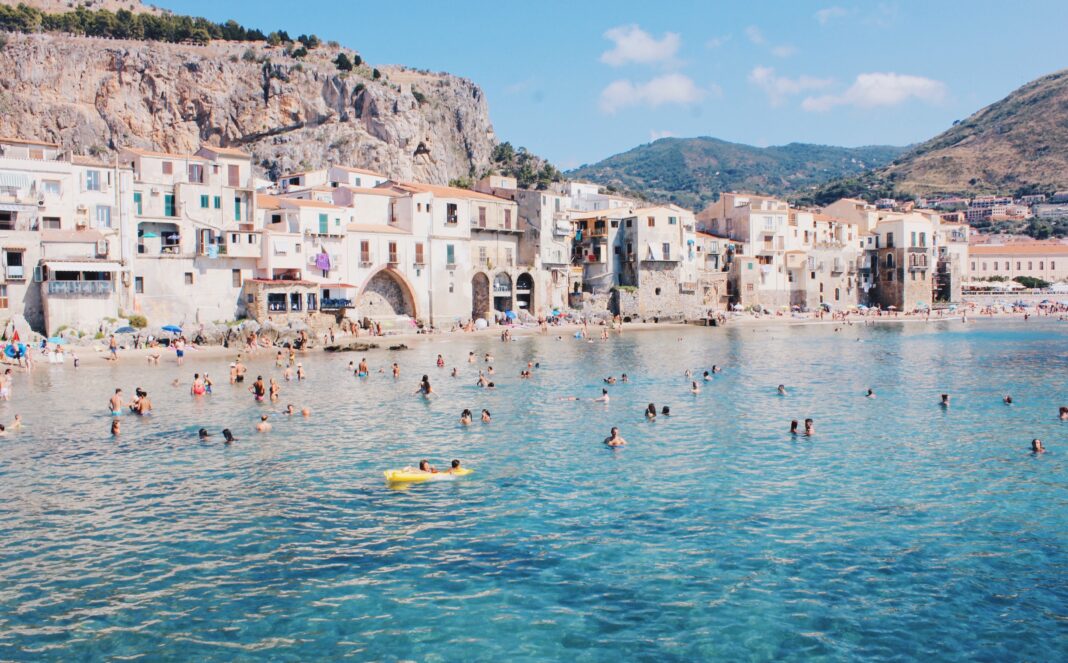If you want to deeply analyze the second season of The White Lotus, which takes place mostly at a luxury resort in Taormina, Sicily, you need to know that Taormina was, starting in the mid-1800s: a destination for well-to-do LGBTQ+ visitors.
That queer history had to have been a factor for showrunner Mike White, who is openly bisexual, in choosing to set his sexcapades-driven satire there. It also provides an insider’s joke to students of history who would laugh at a gaggle of supposedly rich gay men—“These gays, they’re trying to murder me”—stopping at modern-day Taormina on a yachting excursion.
The trend seemed to have been set off by German photographer Wilhelm von Gloeden, who first visited Sicily in 1877 and became well known in certain circles, then much more broadly, for his homoerotic photos of Sicilian men and boys. Von Gloeden perhaps gave uptight queer Northern Europeans the idea that Sicilians were free and easy with their bodies.
Oscar Wilde visited in 1892. And it wasn’t just men who made the journey: in the early 1900s Crimean poet Sophia Parnok, known as “Russia’s Sappho,” visited but, according to legend, left when she realized that Sicilians weren’t as free with their daughters as with their sons.
Though queer writers and artists like Truman Capote, Tennessee Williams and André Gide visited in the mid-20th century, Taormina gradually lost its gay vibe. But it’s amazing how long these stereotypes last. The show’s interest in sex work might have been informed by this power dynamic, though, on TV, the gay-for-pay character Jack is played by British actor Leo Woodall.
Over time, it probably became too upscale for bohemians wanting to dally for months at a time. By the time Tanya (Jennifer Coolidge) and the gang show up at the Four Seasons San Domenico Palace, the real-life location that plays The White Lotus hotel in the show, the place was pretty damn straight.
And it’s true across Sicily. When it comes to attitudes about LGBTQ+ people, Italy remains less open than most of its European Union counterparts, and the island of Sicily probably its least-open region. But that doesn’t make it gay unfriendly—just that the local LGBTQ+ population tends to be less visible than other places. Businesses run by LGBTQ+ people are much less likely to hang a rainbow flag or signal the same in the marketing.
Here’s a quick tour of what LGBTQ2S+ visitors might enjoy on the largest island in the Mediterranean.
One important thing to note before starting out: The seven-colour peace flag can be seen all over Sicily. It can be an anti-war symbol, but often signifies anti-mafia sentiments. Businesses and institutions that fly it might be more progressive and open-minded than those that don’t, but don’t take it as a Pride flag.
Taormina
The hilltop town has become a major upscale beach resort and a stop for package tours. Because of the spectacular geography, visitors need to take a gondola lift, hike or taxi between the town itself and the beach area, much of which is controlled by beachside resorts and businesses. It’s as beautiful as you suspect it is, but quite gentrified and, in peak season, its charming boutique-lined streets get quite crowded. The beaches tend to be small and rocky, which is probably why The White Lotus beach scenes weren’t filmed here (I’ll tell you where that happened later).
One of the most popular public beach spots is the strip across from Isola Bella (a location in the show). You won’t find any specifically LGBTQ+ venues in Taormina, but the cosmopolitan nature of the place means that most businesses are pretty relaxed. Q Lounge Bar (Piazzetta Paladini 6, Taormina) is reported to be gay-friendly. Taormina is about an hour’s train ride up the coast from Catania, one of the two major cities in Sicily, so it can be done on a day trip. The train passes Mount Etna volcano, which can be seen from both Taormina and Catania. But if you want to get closer, there are guided tours that will take you partway up.
Catania
Sicily’s second-largest city has its charms, though you wouldn’t know it by looking at the desolate abandoned-warehouse zone in front of its train station and city transit hub. Get beyond that and you’ll love the handsome Baroque architecture of the city centre, which was rebuilt after a massive earthquake in 1693—by Italian standards, that’s pretty modern. The shopping street Via Etnea, from Piazza del Duomo to Quattro Canti, has been pedestrianized and is a lovely promenade; in the sidestreets off it you’ll find more local shopping and eating options. The maze of streets between Piazza del Duomo and Piazza Currò are where lots of the tourist-friendly indoor-outdoor resto-bar spots are—you can turn a corner and find a DJ playing the patrons of several hotspots.
Though it doesn’t fly the Pride flag, the alt-culture bar Nievski (Via Alessi 15/17, Catania) has long been frequented by LGBTQ+ customers. Local gay group Gruppo Pegaso hosts regular gay parties, which often feature drag performers, at the nightclub Industrie (Via Acquicella Porto 13, Catania).
Though LGBTQ+-focused nightlife is thin, Catania is pretty good for gay and bi male cruising. There are two saunas: SFC Sauna South Factory Club (Via Fischetti 10, Catania), which bills itself as the biggest gay sauna in South Italy, and Terme di Achille Sauna (Via Tezzano 13, Catania). There’s also a sex/cruising club, Codice Rosso (Via Conte Ruggero 48, Catania), which hosts naked and underwear events.
Both Achille Sauna and Codice Rosso, as well as many other cruisier venues across Italy, require patrons to have signed up for an ARCO card, a multibusiness membership system that allows a venue to designate itself a members-only club. A three-month tourist membership cost 10 euros; an all-club 12-month membership costs 17 euros.
Catania Pride happens on June 17, 2023.
Palermo
Palermo, with a melding of ancient Phoenician, Greek, Islamic and Christian cultures that you can see in the architecture and city planning, feels like a much older and more serious city than Catania. Yet the pedestrianized stretches of Via Vittorio Emanuele and Via Maqueda, which cross to create an octagonal square called Quattro Canti, seem to have been reimagined as a playground for visitors, with sidewalk cafés, bistros and boutiques overflowing with handicrafts. Most attractions and monuments are not far from this axis, including several street markets; unless you’re a complete history nerd or are a digital nomad, the city is easily doable in a day or two.
Though very much a port city, the waterfront, where there always seem to be a cruise ship, is industrial and messy and not the main draw here; if you want to hang out on the sea, head to the beach area of Barcarello in the suburban village of Sferracavallo, a beach that has its gay fans.
Palermo’s gay nightlife is more about club nights than venues. PopShock (usually hosted at I Candela (Via dei Candelai 65, Palermo)) is mixed LGBTQ+-friendly, while I Love Tuesday happens at Officina (Via Giuseppe Puglisi Bertolino, 25/27, Palermo) is more gay and Shut Up’s parties at Fabric Club House (Via Ugo la Malfa 95, Palermo) are gayer still.
For cis gay and bi men (the website unfortunately states that trans people are not welcome), there’s the sauna Maxximum Time (Via Alessandro Scarlatti 3), which also requires an ARCO membership. It’s right in the heart of the historic city, steps from perhaps the most famous building in Palermo, Teatro Massimo, so it’s certainly convenient for tourists.
Palermo Pride happens each summer, this year on July 9.
Cefalù
Though this beach town scores low on LGBTQ+ amenities (there don’t seem to be any), it can be argued that it’s more charming, authentic, affordable and family-friendly than Taormina. Perhaps founded as a fortress in the 4th or 5th century BCE, its imposing cathedral, whose construction started in 1131, though it was never finished, is probably its most iconic structure. The town sits between the sea and a steep mountain, La Rocca di Cefalù, which takes about an hour for an experienced hiker to ascend. The beaches are wider and more sweeping than those in Taormina, which is probably why The White Lotus filmed its beach scenes here.
Seeable as a day trip from Palermo or spend a week and chill.
Agrigento
Believe them when they tell you that the best Greek ruins are not in Greece. This ancient colony was founded in the 6th century BCE and was, for a time, one of the leading cities in the known western world. You’re probably coming here to see the Valley of the Temples, but the modern city itself is worth a walkaround—it’s Italy’s City of Culture for 2025. Fans of the Theatre of the Absurd will want to swing by La Casa Museo di Luigi Pirandello. On summer days, gay and bi guys hang out at the nearby beach of Le Dune in San Leone.
Syracuse and Noto
Though the historic port city of Syracuse recently lost its only gay bar, it’s worth visiting not just for its Greek and Roman monuments, but also because it’s so gosh darn pretty. Its historic centre, which has a maze of small streets, is on an island—it feels like a theme park, especially when there’s a religious procession winding through the streets. Syracuse is an hour’s train ride south of Catania, but deserves more than a day trip.
Another hour or so south and by train, there’s the inland town of Noto, which two White Lotus characters visit on an overnight trip. The scene where Harper (Aubrey Plaza) feels like she’s been preyed upon by local men (a scene recreating a scene by Monica Vitti in the 1960 film L’avventura) takes place on the steps up to the cathedral. Like Catania, Noto was also devastated by the earthquake of 1693, only to be rebuilt as a Baroque masterpiece.


